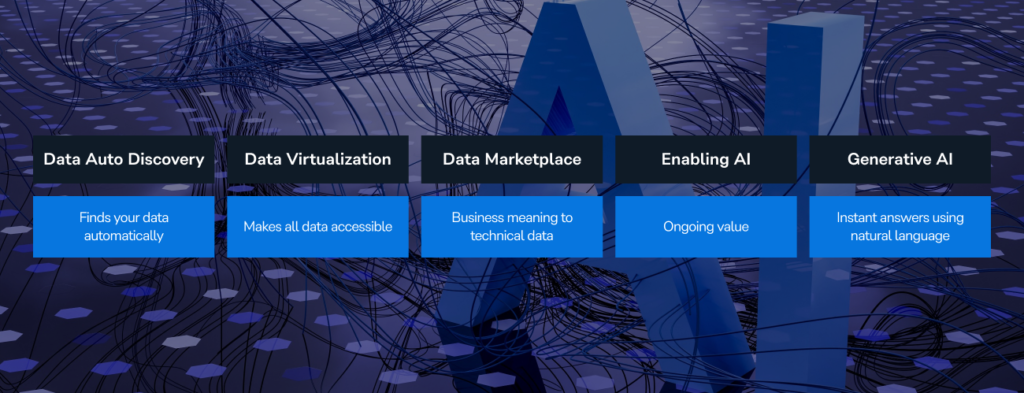The Gartner report “Over 100 Data and Analytics Predictions Through 2028” provides valuable insights into the future of data and analytics. One highlighted area is the rise of data fabric as a crucial factor in addressing the complexity of data management. This is where Stratio, a leading Generative AI Data Fabric vendor, comes into play.
In this article, we will explore how Gartner’s report predictions align with the solutions provided by Stratio. We’ll dive into the 5 steps Stratio’s capabilities to understand how they fit into the changing world of data and analytics.
The rise of data fabric
Data fabric will play a pivotal role in the future of data management, as emphasised by Gartner’s prediction: “By 2025, CDAOs will have adopted data fabric as a driving factor in successfully addressing data management complexity, thereby enabling them to focus on value-adding digital business priorities.”
Data fabric is a method that brings together different types and locations of data into a single and easy-to-use system. It offers a complete picture of data, ensuring it is consistent and allowing for effective data management.
By embracing data fabric, CDAOs can simplify data management, enabling them to focus on essential strategic initiatives that bring significant business value.
Stratio: From data discovery to use and disposal
Stratio covers the whole lifecycle of data management in 5 simple steps:
- Data Auto Discovery: Finds all your data, no matter where it is storage location; on-prem or in the cloud, automatically.
- Virtualization capabilities: Makes 100% of data accessible and usable by automatically discovering and virtualising it. This eliminates the need to physically move the data, improving efficiency and allowing you to act quickly ahead of customers’ fast moves.
- Data Marketplace: Provides access to audited, secured, and controlled data. Unlike other data marketplaces, we prioritise rigorous security mesures and auditing to ensure data accessibility. This guarantees peace of mind when accessing valuable data and enables businesses to derive meaningful insights from technical data.
- Enabling AI: Creates ongoing value and provides new business insights that can spotlight future opportunities.
- GenAI engine: Plays a crucial role in accelerating AI development and automation. With GenAI, business users and data teams can effortlessly develop reports, data workflows, machine learning models, and transactional applications instantly and in natural language without technical skills.

Why do companies need to embrace Stratio’s Generative AI data fabric?
According to Gartner, over a quarter of Fortune 500 Chief Data and Analytics Officers (CDAOs) will be responsible for at least one top-earning product based on data and analytics by 2026. This highlights the increasing importance of leveraging data as a strategic asset for business success.
As CDAOs take on new roles, they become trusted advisors and partners to the CFO, working together to create business value. This highlights the importance of data and analytics strategies that drive growth and help organisations tap into the maximum potential of their data assets.
However, navigating challenges like data mesh complexities and achieving sustainable, automated processes requires robust solutions. Let’s delve into how Stratio’s Generative AI data fabric empowers companies to address these challenges successfully:
Navigating data mesh challenges
By 2025, 80% of data mesh early adopters will fail to meet their planned service-level agreements (SLAs) around data engineering productivity, augmentation, and federated governance.
Data mesh adoption brings potential challenges and risks. These include difficulties in achieving SLAs, managing data engineering productivity, ensuring effective data augmentation, and maintaining federated governance across the mesh. Overcoming these challenges requires careful planning, expertise, and robust solutions.
Stratio enables companies to navigate data mesh challenges successfully by ensuring data accessibility, accelerating AI development, and offering valuable insights.
Data ecosystems and consolidation
By 2025, 55% of IT will adopt data ecosystems, consolidating the vendor landscape by 40%, thereby reducing costs while streamlining operations.
Embracing data ecosystems brings several benefits, including cost reduction and simplification of the vendor landscape. Organisations can achieve economies of scale, improved interoperability, and streamlined data management processes by leveraging a unified ecosystem.
With its capabilities, Stratio allows businesses to consolidate their data [ecosystems] when they are ready and it’s convenient to do so, [reduce costs], and gain greater control over their data assets. By adopting Stratio’s platform, companies can harness the power of a unified data ecosystem while maximising efficiency and value from their data.
Environmental sustainability and AI
Environmental sustainability will be a crucial criterion in data management initiatives by 2026, including the domain of AI and analytics.
Recognising the importance of environmental sustainability, companies are increasingly integrating it into their data management strategies. This involves minimising GHG emissions, optimising asset utilisation, and incorporating sustainable practices throughout the data lifecycle.
Stratio is committed to environmental, social, and governance (ESG) principles. We implemented measures to improve our sustainability practices, such as reporting ESG metrics and actively working towards reducing its environmental impact. By choosing Stratio as a partner, companies align their data management efforts with sustainable practices.
The automation revolution with AI
Companies that invest in AI will experience a groundbreaking transformation by 2027, as AI-driven processes become capable of independently processing 60% of IT and digital initiatives without the need for human intervention.
AI-powered automation brings unprecedented levels of efficiency, accuracy, and speed to routine tasks, freeing up employees for more strategic and value-adding activities.
By integrating Stratio’s data fabric into their operations, organisations can discover the full potential of AI. Stratio’s Generative AI data fabric empowers businesses to automate data integration, transformation, and analysis.
CTA to Stratio’s Data Fabric
Access Gartner´s Data and Analytics Predictions Through 2028 uncover invaluable insights into the future of data management. The report provides a valuable perspective on the industry trends and reinforces the relevance of Stratio’s Generative AI data fabric solutions in the evolving data landscape.
Contact Stratio BD to find out how Generative AI Data Fabric helps companies with their data management challenges and helps businesses to consolidate their data ecosystem easily, safely and cost-effectively. Stay ahead in this data-driven era.
Gartner, Over 100 Data and Analytics Predictions Through 2028, 24 April 2023, Sarah James, Alan D.Duncan, et. al.
GARTNER is a registered trademark and service mark of Gartner, Inc. and/or its affiliates in the U.S. and internationally and is used herein with permission. All rights reserved.




